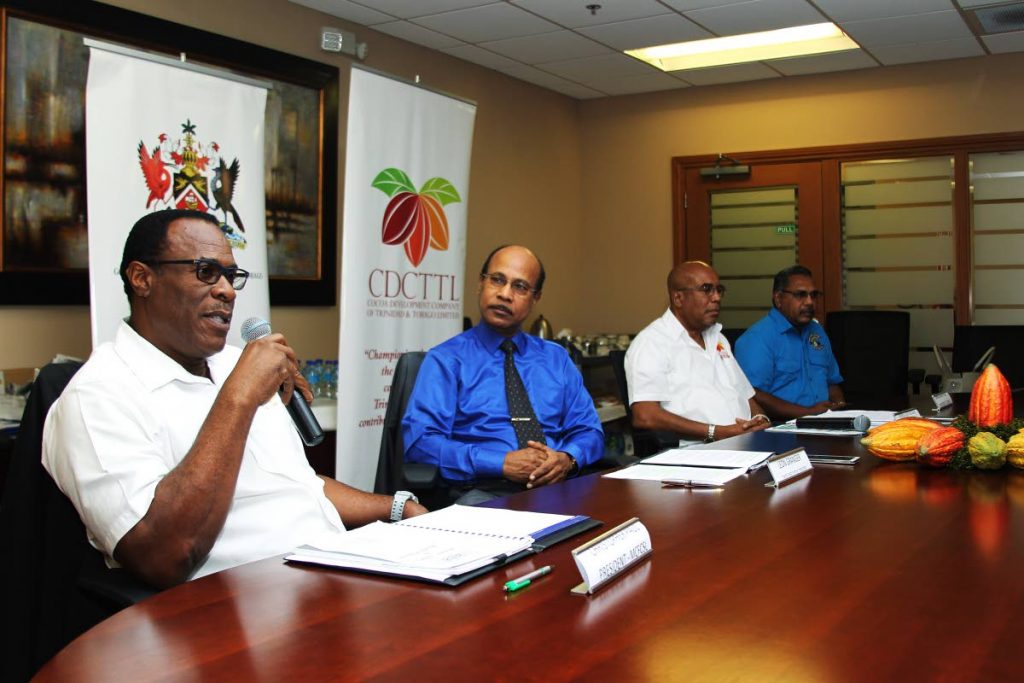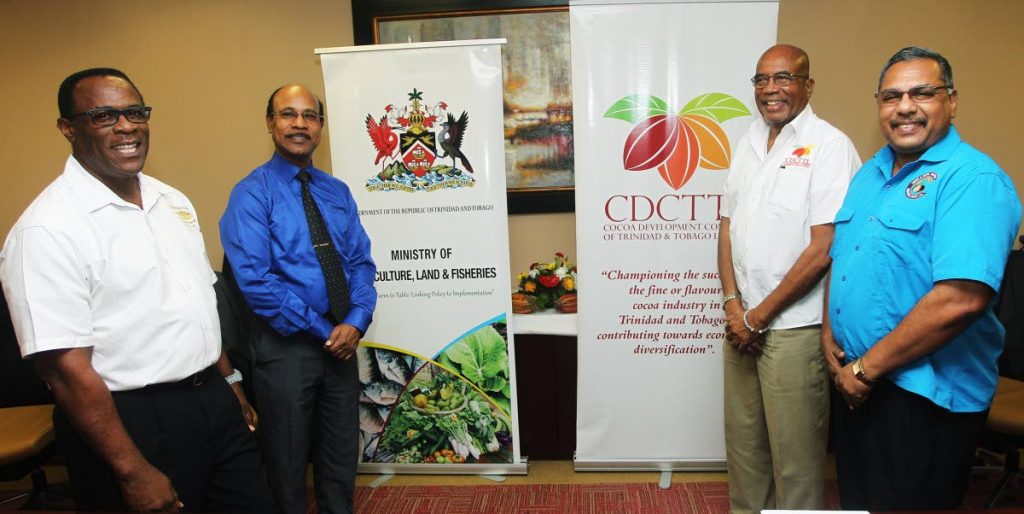Making cocoa king

DESPITE challenges facing the global cocoa industry, there remain opportunities for people to invest in the local sector and help make TT cocoa king again.
Cocoa Development Company of TT Ltd (CDCTTL) chairman Winston Rudder and industry stakeholders expressed these views at a news conference at the Agriculture Ministry’s headquarters in Chaguanas on Monday.
Rudder said 1,500 cocoa stakeholders met last month at the Fourth World Cocoa Conference in Berlin, Germany. While TT has been a producer of fine and flavoured cocoa for many years, Rudder said that status is under threat.
According to Rudder, the International Cocoa Organisation (ICO) has come under pressure from producers and importers. What this means, Rudder continued, is that, “countries that are currently fine or flavour cocoa producers will have to prove that they deserve to remain among the list of fine or flavoured producers.”
With other countries “stepping up to that plate,” Rudder said TT cannot afford to rest on its laurels and believe that being a fine and flavoured cocoa producer, is its birth right. For this reason, efforts are underway to ramp up domestic cocoa production.
To deal with these challenges, Rudder continued, the company and local stakeholders have developed a draft strategic plan. CDCTTL CEO Leon Granger said the company has started taking stock of the number of cocoa trees in TT.
That exercise will be completed by October 31. Rudder also said the plan includes the rehabilitation of old cocoa estates as well as new ways to market TT cocoa and its by-products.
“We are not acting in a vacuum,” Rudder said. He identified labour as one of the key issues affecting the sector.
The cocoa fraternity, Rudder continued, has made suggestions about the use of some funds for CEPEP to help boost cocoa production. On financial support provided by Government, Rudder said he would “like it to be more.” He added that funding for the sector is currently spread between several institutions.
Rudder said it is important for people to realise there remains tremendous opportunities for TT cocoa. He stressed it was important to see trends in the global industry and in developing markets, “as opportunities.” Rudder said if industry stakeholders realise this, “we can take advantage.”
Explaining that fine or flavoured cocoa is composed of the “finest genetic material that one could look for,” Rudder said TT’s cocoa already has this material. In addition, Rudder said this country possesses a supportive cadre of researchers and technicians who are making great strides to improve the local cocoa stock.
He said one of the things local experts are looking at is reducing the presence of heavy metals in cocoa. Rudder explained this is important because of new standards which the ICO will employ in January.
He said greater emphasis must be placed on how TT’s cocoa and its by-products are marketed, branded and merchandised.
Rudder said the fine and flavoured cocoa produced in TT is of superior quality to other cocoa on the market. “What we call chocolate is really chocolate candy. A lot of milk and a lot of sugar,” he observed.
Saying he has taken TT cocoa to meetings overseas, Rudder said by-products such as creams and soaps can mesh well with demands of the tourism sector. Cocoa and Coffee Marketing Cooperative Society Ltd (CCMCS) president Sham Mohammed said he met with potential investors at the conference in Berlin.

Holder 14-5-18
With many aging farmers in cocoa, Rampersad said more needs to be done to encourage young people to get into cocoa farming. Noting the CCMCS buys the crops, Rampersad said many people in cocoa sector are small farmers. He explained this is why his group encourages them to form co-operatives.
He said a recently formed cooperative in Rio Claro is doing very well. Rampersad hinted this group may also launch its own brand of coconut water.
Monsterrat Cocoa Farmers Co-operative Society president Christopher Paul welcomed the rehabilitation of old cocoa estates. He advanced an inter-crop farming model as a way to not only increase cocoa production but the production of other crops as well.
Paul explained that young cocoa trees need shade in which to grow. Banana trees, he said, provided the perfect cover for these trees. While the cocoa trees are growing, Paul said the farmers can earn revenue by selling the bananas. Avocadoes are another crop which could be grown alongside cocoa and from which revenue can be obtained, Paul said.
He also said TT does not have to deal with problems which other cocoa producing countries have, such as child labour. Paul indicated the market for fine/flavour cocoa was niche, because of its high quality and unique flavour notes.
It accounts for five per cent of the world’s cocoa production, and therefore commands a premium price. The loss of this status could be detrimental to the local cocoa industry.
Granger said TT has six months to meet a deadline of October 3, to compile the dossier with information on cocoa stock, estates, varieties and other attributes, for submission to the ICO for TT to maintain its fine/flavour status.
Rudder said while bulk cocoa producers earn revenue of approximately US$1,500 per tonne, fine and flavoured cocoa producers earn “three times that.” In the Berlin Declaration emerging out of the Fourth World Cocoa Conference, ICO executive director Dr Jean-Marc Anga said, “Business as usual in the cocoa sector is no longer an option. We have to break the mould.”
While sector-wide efforts have proliferated to improve the lives of farmers, communities and the environment, since the First World Cocoa Conference and the drafting of the Global Cocoa Agenda in November 2012, Anga said, “These have not been enough to achieve significant impact at scale.”
With too many cocoa farmers still living in poverty, issues such as deforestation and child labour remain a daily reality in many cocoa producing countries, Anga said. "A sustainable cocoa sector is a collective responsibility of all stakeholders and we should work together to achieve this ambitious goal.”


Comments
"Making cocoa king"